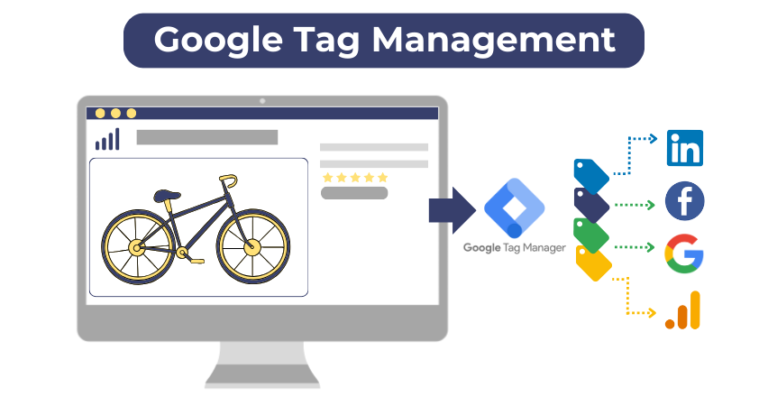Google Tag Manager & Conversion Tracking
Boost your PPC performance with Google Tag Manager
Let us set up your tagging, conversion & event tracking:
1. Improved PPC Results
2. Enhanced PPC Learnings
3. Accurate PPC Predictions
4. Efficient PPC Budgeting

Why is Google Tag Manager and conversion tracking essential for online businesses?
Google Tag Manager (GTM) is important for online businesses because it provides a centralised platform for managing all the tracking codes and tags used to collect data on website interactions. It streamlines the process of passing visitors’ interactions data to Google, Meta and LinkedIn, enabling both algorithms and users to make informed business decisions. Without Google Tag Manager, inserting each tracking code manually into a website’s code is time-consuming and prone to errors.
Why is conversion tracking important for PPC campaigns?
Improved Results
Google’s algorithm relies heavily on conversion data. If you don’t provide enough data, you won’t get the best outcomes. Maximising data input helps drive consistent results.
Enhanced Learnings
Without sufficient conversion data, the system takes longer to learn. This delays understanding what works and what doesn’t, prolonging the learning phase.
Accurate Predictions
Limited conversion data can lead to less informed predictions by the system. This may result in less accurate bidding decisions, causing inefficiencies.
Efficient Budgeting
Inadequate data can lead to less effective budget allocation, resulting in inefficient spending.
Why choose AdSuccess for your Google Tag Manager conversion tracking needs?
With our expertise, your website benefits from seamless integration and optimised tracking. We thoroughly understand tag management intricacies, ensuring efficient customisation to meet your tracking requirements and facilitating accurate data flow for informed decision-making and campaign optimisation, allowing you to focus on business growth.
What is Google Tag Manager?
Google Tag Manager, also known as GTM, is a free tool offered by Google, serves as a central hub for managing tracking codes (including marketing and analytics tags) and code snippets on websites and apps. This includes overseeing various codes such as Google Analytics tracking code, Google Analytics events, Facebook Pixel code, Google Adwords Conversion code, and more. Before the creation of tag management tools like GTM, developers were required to implement these codes / tags on websites and apps.
Want our help to set up Google Tag Manager to track your conversions?
Click the below link and use the contact us form. One of our experts will be in touch.
What does our Google Tag Management service include?
- Google Tag Manager Audits – We’ll check your Google Tag Manager, cookie consent, and data layer setup to make sure it collects accurate data and reports on the metrics that matter for your digital analytics and ad platforms. Getting the data right is crucial.
- Cookie Consent Audit & Privacy – We’ll review your tag implementation to ensure it follows the changing rules of data privacy and cookie consent.
- Tagging Strategy & Solution Design – We’ll define and design the tag solution.
- Tag Manager Implementation – We’ll work with your marketing, product, and developer teams to ensure Google Tag Manager and data layers are smoothly integrated across your digital presence.
- Server-side Tracking (Optional) – We strongly recommend setting up a server-side GTM to manage all your 3rd party tracking to increase the number of conversions tracked by up to 20%.
Other Google Tag Manager FAQs
Google Tag Manager is a tool designed to simplify the process of managing and deploying tracking codes, known as tags, on websites. It allows users to add, edit, and remove tags without directly altering the website’s code, streamlining the tracking of various user interactions and events.
Yes, Google Tag Manager is free to use. There are no costs associated with creating an account or using the basic features of the platform.
Google Tag Manager offers a range of benefits, including simplified tag management through its user-friendly interface, enabling quick addition of tags. It provides advanced tracking capabilities like event tracking and seamless integration with Google products.
While it’s designed for non-developers and provides an easy-to-use web interface for editing tags and making changes, navigating complex tag configurations still requires expert help. That’s where AdSuccess can step in to provide the necessary expertise and support for seamless management of your GTM setup.
Google Tag Manager (GTM) and Google Analytics (GA) serve different purposes. GTM is primarily a tag management system that helps manage and deploy tags on websites, while GA is a web analytics platform that analyses and reports website traffic and user behaviour.
No, Google Tag Manager is not limited to working only with Google products. While it integrates seamlessly with various Google services such as Google Analytics and Google Ads, it can also be used to deploy tags for third-party analytics, advertising, and marketing platforms (for instance Meta, Linkedin).
Yes, Google Tag Manager can utilise cookies for tracking purposes. Cookies are commonly used to store information about user interactions and preferences, which can be utilised by tags deployed through GTM.
In Google Tag Manager, tags are snippets of code that collect data, triggers determine when and where tags are fired based on user interactions or other conditions, and variables store and manage information that can be used by tags and triggers to customise tracking behaviour.
While Google Tag Manager offers numerous benefits, such as simplified tag management and enhanced tracking capabilities, there are some limitations and drawbacks to consider. These may include potential errors in tag implementation and dependency on third-party services.
Server-side Google Tag Manager is a variation of GTM where tags are processed on the server rather than the client’s browser. This approach offers benefits such as improved website performance and enhanced data privacy and security, but it requires more technical expertise to set up and manage compared to traditional client-side GTM implementations.
Still have more questions?
Click the below link and use the contact us form. One of our experts will be in touch.
